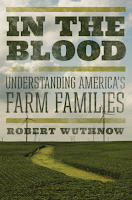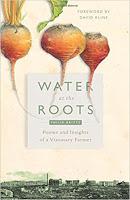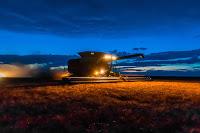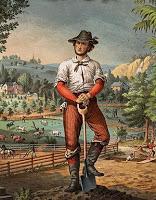 [Cross-posted to Front Porch Republic]
[Cross-posted to Front Porch Republic]The obvious response to the title of this post is: I don't know; why don't you ask one? Well, Richard Wuthnow and his researches did, at great length. The result is In The Blood: Understanding America's Farm Families, the last (it was published in 2015) of a list of books which Wuthnow's extended sociological study of America's small, rural, mostly agricultural, mostly Midwestern places, and the people who live there, has produced. Earlier this year, while thinking about Wuthnow's latest book, The Left Behind: Decline and Rage in Rural America, I ended up exploring this series by Wuthnow to learn what it can tell us about how those of us who are part of, or next door to, or have memories of, or are in other ways dependent upon, the productive world of those who work the land think about the changing world around them. In The Blood didn't change my mind about that analysis, but it did deepen it quite a bit.
The clearest point which comes through Wuthnow's thoughtful engagement with the dozens of farmers he and his assistants interviewed, and with the reams of data about rural populations, farm economics, and more that they assessed, is simply this: most American farmers, most of the time, are not agrarians. This is hardly news to anyone who takes conversations about localism and sustainability at all seriously--but still, for people like me, for whom the appeal of agrarian thinking is strong, such reminders are necessary. When Rod Dreher quotes, as he did just recently, Wendell Berry's "The Work of Local Culture," with its determined placing of hope in the few surviving rural places in America--because "rural people...see all around them, every day, the marks and scars of an exploitive national economy....and in rural communities there are still farms and small businesses that can be changed according to the will and the desire of individual people"--he adds mournfully "Berry published that thirty years ago. I don’t know how true any of it still is. Very little, perhaps." He was right to say so. Wuthnow isn't focused on the farming families of the 1970s and 1980s, much less on the farming families of the 1870s and 1880s (even assuming the more community-oriented, nature-connected, and self-sufficient world which agrarianism holds as an ideal was achievable then, which is doubtful). Rather, he's focused on those farmers who still live today in small towns or on isolated plots throughout the American South, Midwest, and Great Plains, farming families and individuals who have survived multiple financial crises and technological transformations and found a way to survive in the 21st century. That survival has required huge changes in how farmers think, and what they hope for.
 I recently finished a beautiful little book, Water at the Roots: Poems and Insights of the Visionary Farmer, a collection of writings by and a brief biography of a man named Philip Britts, an Englishman born in 1917 who became a pacifist, joined the Brudehof community, relocated with that group to Paraguay in the early days of World War II, and spent the rest of his short life (he died in 1949) farming, writing poetry, and preaching to his fellows. There is much beauty in his thoughts, and a quiet radicalism too; in a 1946 essay, "How Shall We Farm?," Britts urged caution in regards to post-WWII trends in agriculture science; while he said there was no reason to reject all technical achievements--"we still believe in 'the useful plow'"--he warned that the worst possibility of progress would be to lose the organic connection with and intimate, tactile knowledge of the land: unlike "that indescribable sensation that comes, perhaps rarely, when one walks through a field of alfalfa in the morning sun, when one smells earth after rain, or when one watches the ripples on a field of wheat." That is the agrarian spirit, the spirit of Wendell Berry and so many localists everywhere. It is a spirit, unfortunately, which Wuthnow's respectful engagement with the rural world of today reveals to be mainly quaint, and little more. True, there are farmers whom Wuthnow interviewed that shared that kind of immediate connection with their land (he writes about a wheat farmer who likes to drive out to one of his fields in the evening. "I just listen to the crops grow...listen to nature, take time to meditate, soak it all in")--but more of them were quick to downplay any view of the land that was "too pretty and romantic." Instead, they conveyed--insisted, really--that the "real business of farming" today is "managing information" (pp. 127, 132, 134). As Wuthnow summarizes:
I recently finished a beautiful little book, Water at the Roots: Poems and Insights of the Visionary Farmer, a collection of writings by and a brief biography of a man named Philip Britts, an Englishman born in 1917 who became a pacifist, joined the Brudehof community, relocated with that group to Paraguay in the early days of World War II, and spent the rest of his short life (he died in 1949) farming, writing poetry, and preaching to his fellows. There is much beauty in his thoughts, and a quiet radicalism too; in a 1946 essay, "How Shall We Farm?," Britts urged caution in regards to post-WWII trends in agriculture science; while he said there was no reason to reject all technical achievements--"we still believe in 'the useful plow'"--he warned that the worst possibility of progress would be to lose the organic connection with and intimate, tactile knowledge of the land: unlike "that indescribable sensation that comes, perhaps rarely, when one walks through a field of alfalfa in the morning sun, when one smells earth after rain, or when one watches the ripples on a field of wheat." That is the agrarian spirit, the spirit of Wendell Berry and so many localists everywhere. It is a spirit, unfortunately, which Wuthnow's respectful engagement with the rural world of today reveals to be mainly quaint, and little more. True, there are farmers whom Wuthnow interviewed that shared that kind of immediate connection with their land (he writes about a wheat farmer who likes to drive out to one of his fields in the evening. "I just listen to the crops grow...listen to nature, take time to meditate, soak it all in")--but more of them were quick to downplay any view of the land that was "too pretty and romantic." Instead, they conveyed--insisted, really--that the "real business of farming" today is "managing information" (pp. 127, 132, 134). As Wuthnow summarizes:Among farmers whose relationship to the land was becoming more distant...an important result was that their understanding of the land was less visceral and more conceptual. The land was still a matter of bodily experience to the extent that it felt a certain way when walking across it and looked and smelled in familiar wars after a warm spring rain or during harvest. The embodied relationship to the land, though, was less prominent in farmers' descriptions than accounts of its size, history, ownership, and use....Acreage that used to be measured by walking a field in yard-length steps was now measured by satellite imagery. An experienced farmer could still guess the approximate yield by walking into a field of wheat or cotton, but computerized information could now tell the exact yield for each part of the field. Seeds were distinguished by the numbers assigned to them by agribusiness companies rather than by feel. There was no regret in farmers' descriptions of these changes, only an awareness that the meanings of farmland were shifting as a result (pp. 132-34).
In other words, what is found in the rural parts of America today, and the probably fewer than 3 millions people total engaged in agricultural work there (in an age of concentrated animal feeding operations and global seed and fertilizer corporations, definitions of "agricultural worker" can get a little vague), isn't, by and large, clones of Wendell Berry, Philip Britts, and others who have articulated a vision of the good life intimately connected to the land. But to decide that I, therefore, don't have anything to learn from what the farmers of today hope for would not only make my localism even more hypocritical than it already is, but would out me as, in Rod's words, one of those "educated elites who read Wendell Berry sympathetically but have no use for actual rural white people who aren’t Wendell Berry." I don't want that. So....what else does Wuthnow's research reveal about those who occupy that place which Jefferson once imagined to be the heart of a pastoral nation, but which today--at least if economic power and cultural authority is taken to be the measure of where a nation's heart is to be found--is anything but? Well, of the many points the book makes about family, faith, and farming in rural America, here are a few take-aways:
--Economics and social patterns and history and race all play into the political conservatism of nearly all of white rural America, but that shouldn't eclipse the fundamental dispositional conservatism of those who choose to farm, or choose to stick with it. Generational continuity and "being significantly connected to the past" is central to "the mentality of farming," in Wuthnow's judgment. Some of the farmers he interviewed make statements about family traditions and the legacy of the dead which sound straight out of out of Edmund Burke or Alasdair MacIntyre: "this experience of intergenerational continuity," Wuthnow observes, is what farmers mean when they say that farming is in their blood" (p. 14). Unlike the great bulk of professions in America today, the few farmers which remain regularly see their work as an inherited vocation, and a meaningful one at that.
 --Farmers are deeply aware of how the community consciousness which shaped the world they inherited from their parents has been weakened by the reach of modern technology (more here), the demands of commodity agriculture (more here), the abandonment of controls which once privileged sustainability over profit (more here), and the competitive mindset which all three have exacerbated. Distances are greater, towns have emptied, fields have grown larger, and the farmers which manage to hold on economically are obliged/encouraged/pushed to pick up distant plots that keep them even further away from one another. "Mr Hebner...said the farmers in his community simply are less visibly present than they were when he started farming. He thinks about this when he cuts wheat at night. There used to be a kind of togetherness from seeing a neighboring farmer's combine lights in an adjacent field. Now those lights are much further away, if they are still visible at all" (p. 53).
--Farmers are deeply aware of how the community consciousness which shaped the world they inherited from their parents has been weakened by the reach of modern technology (more here), the demands of commodity agriculture (more here), the abandonment of controls which once privileged sustainability over profit (more here), and the competitive mindset which all three have exacerbated. Distances are greater, towns have emptied, fields have grown larger, and the farmers which manage to hold on economically are obliged/encouraged/pushed to pick up distant plots that keep them even further away from one another. "Mr Hebner...said the farmers in his community simply are less visibly present than they were when he started farming. He thinks about this when he cuts wheat at night. There used to be a kind of togetherness from seeing a neighboring farmer's combine lights in an adjacent field. Now those lights are much further away, if they are still visible at all" (p. 53). --If there is one political commonality which has likely been continuous with the majority of the whole history of farming in America, it is that farmers understand themselves to be, and insist upon the right to be, their own bosses. At times this really did present itself in Jeffersonian terms (such as the one farmer who commented that there were "two classes of people...there were people in business for themselves....and there were those who worked for wages: they were in second place"--p. 103). It affects the way those committed to farming think about authenticity, responsibility, accomplishment, and knowledge: real independence means being true to one's own fundamental character, accepting responsibility for one's own mistakes and not hiding the value of one's own work, and prioritizing that which is learned through and is specific to particular experiences. Hence there was, again and again in the farmers' comments, a strong defense of property rights, a skepticism towards (or, just as often, a worried concern about) abstract, non-contextualized knowledge claims, and an emphasis upon practical education and respecting the rules (pp. 111, 115, 155).
--If there is one political commonality which has likely been continuous with the majority of the whole history of farming in America, it is that farmers understand themselves to be, and insist upon the right to be, their own bosses. At times this really did present itself in Jeffersonian terms (such as the one farmer who commented that there were "two classes of people...there were people in business for themselves....and there were those who worked for wages: they were in second place"--p. 103). It affects the way those committed to farming think about authenticity, responsibility, accomplishment, and knowledge: real independence means being true to one's own fundamental character, accepting responsibility for one's own mistakes and not hiding the value of one's own work, and prioritizing that which is learned through and is specific to particular experiences. Hence there was, again and again in the farmers' comments, a strong defense of property rights, a skepticism towards (or, just as often, a worried concern about) abstract, non-contextualized knowledge claims, and an emphasis upon practical education and respecting the rules (pp. 111, 115, 155).--That commonality, though, is exactly what leaves so many of the farmers Wuthnow and his team interviewed feeling such ambivalence about matters of technology and trade. No serious, non-intentional-community-dwelling (e.g., non-Amish), full-time commodity farmer or rancher in America today fails to understand themselves as businesspeople, and that means they are always conscious of how using advanced technologies and expanding into new trading markets can increase their revenue and provide them with more financial security. But that financial security, many of them seem to think, comes with the price of reduced independence. The development of new breeds of crops has been going on "since the dawn of time," according to one farmer--but now genetically modified seeds and grains "all are copyrighted and owned by agribusinesses somewhere," forcing farmers to accept legal consequences if they don't follow specific instructions while using the seed. The ability of large agricultural corporations to dominate trade opportunities are seen as only speeding the destruction of rural communities--as another farmer put it, Monsanto, Tysons, and Archer-Daniels-Midlands may "have a community outreach program, but it ain't nothing compared to what the family farmer can do." Hence, even the most independent-minded farmer Wuthnow spoke with still insisted, like everyone else, that farming subsidies from the federal government were essential: "If you want the government out of it, then you get the Rockerfellers in there....and it'll be one big guy who will dictate things" (pp. 161, 179-181).
It may be that ultimately we won't be able to avoid that end; the constant drumbeat of production, production, production ("if we want to avoid mass malnutrition, we're going to have to up our food production by 70 percent by 2050"!) makes it almost impossible to contemplate turning American farmers in a more organic and localized direction, even if there was either the will or a strategy for doing so, which there isn't. What that will mean for the ways of life and particular virtues (admirable if, unfortunately, not necessarily agrarian ones) of America's farming population? Little good, perhaps. Depression and suicide in farming communities is a huge and growing problem social problem. The trade wars which President Trump seems determined to wage divide one group of farmers and ranchers from another, along partisan and regional lines. Perhaps the future envisioned by some farmers, of "robotic-driven machinery that would permit farmers to avoid fieldwork altogether and genetically engineered seed that would dramatically increase yields and render irrigation unnecessary," a future where family farming would still exist for only for ever "fewer and fewer families" (p. 161), is the best that can be hoped for.
 Wuthnow though, for his part, doesn't think so. He is not a critical or comprehensive thinker; rather, he reports on what he sees and hears, and puts it together as best he can. He feels no loss for the mostly mythical agrarian worlds of the past, nor (unfortunately, in my view) for the various intentional agrarian communities and programs that have, on occasion, managed to allow the visions of people like Britts and Berry to flourish. He does note, that, that human beings are inventive, changing definitions and narratives of meaning and schemes of valuation as their contexts change as well. He concludes:
Wuthnow though, for his part, doesn't think so. He is not a critical or comprehensive thinker; rather, he reports on what he sees and hears, and puts it together as best he can. He feels no loss for the mostly mythical agrarian worlds of the past, nor (unfortunately, in my view) for the various intentional agrarian communities and programs that have, on occasion, managed to allow the visions of people like Britts and Berry to flourish. He does note, that, that human beings are inventive, changing definitions and narratives of meaning and schemes of valuation as their contexts change as well. He concludes:Whether the deep meanings inherent in farming are sufficiently robust to withstand contemporary challenges remains to the be seen. It worries farmers that neighbors behave like sharks in the water and that more of these neighbors are investors who have little understanding of farm life or are corporations....[But] farming is fundamentally local and thus inherently diverse. If there is a subculture shared to an extent by farmers in different parts of the country, it is a pattern of meanings and values that is also refracted through the local adaptations that each family has made. It reflects the distinctive opportunities and constraints that the land provides (p. 189).
Here in Kansas, where nearly 90% of the total land area is given over to industrial agriculture, such adaptations and opportunities are hard to find. But nonetheless they exist--as local co-ops, entrepreneurial experiments, small-scale grants, and more. My father, born in 1943, was convinced that by the time his children were grown, we'd all be living off vitamin pills, and that the feed mill he took over from his father would go the way of all the earth. But that hasn't happened (yet); some kind of real work with plants and animals and the land, corporatized and industrialized as so much of it is, yet remains. My father is gone now, and the agricultural world he knew and brought us kids up in--milking cows by hand, cutting alfalfa, bailing hay, etc.--is gone for the majority of those who had access to it a half-century ago as well. Hence, I can sympathize with Rod, once again, when speaking of his own father: "People of my generation and younger don’t know the land like they did, because we didn’t live on it, and with it, like they did....There’s so much we don’t know, and never will know, because they are gone, and there aren’t enough of us to carry on their work." All true...and yet, the families and towns--some of them, anyway--are still there. They have a greater understanding of their ambivalent situation, and greater energy to engage its challenges on the local level, than simple-minded red-blue, Republican-Democrat readings of rural America allow. What do farmers want? For help and assistance in rethinking and thereby preserving their livelihood, one place at a time. It's a good work to be called to, I think.
